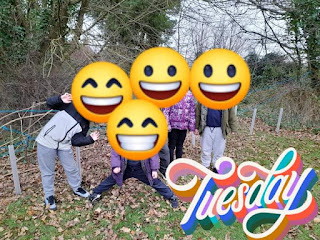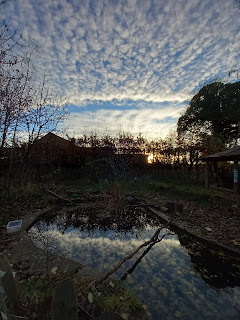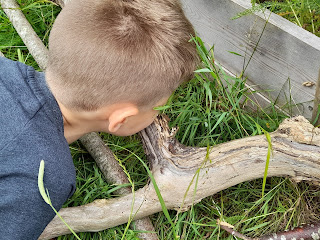Focus
New Year and a New Timetable, one that allows me to work with small groups of children as well as whole classes.
Forest School remains PPA cover and up to 30 children outside exploring together for 2 hour session, but the small groups are 30 minutes of focused time that allows the children to explore something in greater detail.
We aim these projects at children who need to build their confidence, communication, and/or self-esteem, and this is far from an original idea!
The groups each have a different focus, a task or plan that I need help to complete. Sometimes I need them to help me brainstorm ideas and solutions, sometimes I require a little practical help.
I'm not the only Forest School Leader to do this, not even at our school! Between us we have gardening groups, Eco Clubs, and Wildlife Wardens.
Some time is 1-to-1 for children who need as little distraction as possible. Other sessions are designed for children to find their voice, give an opinion, and be listened to. They may need them to see a task through from beginning to end, to follow instructions and work as a team. They may need to get physically involved, used muscles and energy, they may need to report back, talk about what they've done and why. They may just need a little pressure free time doing a job they enjoy.
Sessions require any combination or even all these skills.
At Chartham we are lucky enough to have a Radio Station. It's pretty defunct in this digital age, but the equipment and radio room adapt well for recording podcasts. Articulating what we're doing is a meaningful way to both record what the children are doing, how they feel about it, and boost their confidence and communication skills.
We're only two thirds of the way through term, so there's no way to judge how well it will all work. The children involved at the moment are enthusiastic to join in and their envolvement and motivation improves each session.
The children can't wait to get outside, we even have our discussion sessions at basecamp. Their contribution allows their prior knowledge and interests to shine through, and the small nature of the groups allows them to talk about all kinds of things that may not find an opportunity to be aired in any other space.
I also mix the year groups, the older children can help guide the younger ones, and the smallest listen very well to their older peers.
We have been creating a specific area for birds, planting hedges, and clearing spaces of litter and debris to make them useable.
The levels of contribution have increased each week. Hopefully this will continue as nothing is ever a quick fix and participating long term will have a more tangible impact. Although it's important that the children engage within their small groups, we want their strengthened skills to be evident back in the classroom.
I can keep track of how well the children progress in their groups, but only the class teachers can say if there is an improvement in attention, focus, attitude, motivation, confidence, and communication in other aspects of their learning
Small groups are vaguely hectic. They require planning, prepping, and assessing whether they are for an entire morning or for 30 minutes, and quite a few sessions can be squeezed in across a week!
The Children are enjoying feeling useful. Their actions are making a difference. They also feel heard, as they choose the direction their projects go. They also like the idea that they may be directing the future... THEIR future.
Obviously, you don't need a qualified Forest School Leader to provide this kind if intervention, but you do need someone who is happy to be outside in all weather! I can highly recommend arranging some kind of Outdoor sessions if you can, but as a school, if you have a FSL on staff, chances are you have the space, and you have a person in the building who can deliver these successfully!
Interventions for maths and English catch up is essential, but if children are falling behind because they're struggling with self-esteem, strengthening their view of themselves as learners will improve their academic performance more holistically.
There is no guarantee of success in any intervention, and with school timetables being stretched, ensuring they actually happen can be difficult!
All children benefit from small group learning. All humans benefit from being outdoors. All subjects benefit from pupils who are curious, focused, and happy to be there.
So let's work towards that.










Comments
Post a Comment